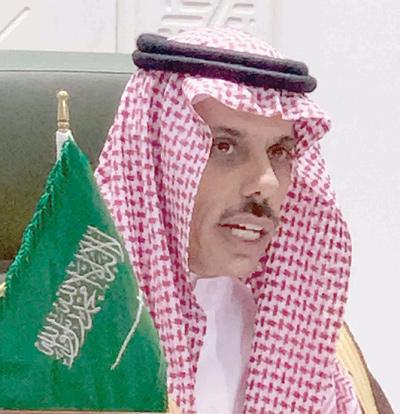- International News
- Web-2021-03-24 | 02:19 pm

Nayrouz News Agency :
Saudi Arabia on Monday offered Yemen's Houthi rebels a "comprehensive" UN-supervised ceasefire, as part of a series of new initiatives aimed at ending a catastrophic six-year conflict.
But the Iran-backed Houthis, who have recently stepped up attacks on the kingdom, including its oil facilities, dismissed Riyadh's initiatives as "nothing new".
The insurgents have also been pushing to seize the Saudi-backed Yemeni government's last northern stronghold, in an escalation of the country's six-year conflict.
The initiative includes "a comprehensive ceasefire across the country under the supervision of the United Nations", a Saudi government statement said.
Riyadh also proposed reopening the airport in Sanaa, the rebel-held capital, and restarting political negotiations between the Yemeni government and the Houthis, the statement added.
"We want the guns to fall completely silent," Saudi Foreign Minister Prince Faisal Bin Farhan told reporters in Riyadh.
"The initiative will take effect as soon as the Houthis agree to it."
The Houthis dismissed the Riyadh initiatives as "nothing new" and reiterated their demand that a Saudi-led air and sea blockade on Yemen be lifted first.
"Saudi Arabia must declare an end to the aggression and lift the blockade completely," said Houthi spokesman Mohammed Abdulsalam, according to the rebel's Al Masirah television.
In April last year, the Saudi-led military coalition battling the rebels began a temporary ceasefire in war-wracked Yemen to prevent the spread of coronavirus, but the Houthis dismissed the initiative as political manoeuvering.
The latest proposal follows a renewed push by the US administration of President Joe Biden to revive stalled peace talks.
The United States, which has pulled support for the kingdom’s offensive operations in Yemen, has condemned a spike in Houthi drone and missile attacks on the kingdom.
A drone strike sparked a fire at a Riyadh oil refinery on Friday, in the second major assault this month on Saudi energy installations claimed by the Iran-backed insurgents.
The Houthis are also battling towards Marib, the government’s last northern stronghold, piling pressure on Saudi-backed forces.
At the weekend, the Saudi-led coalition said it had launched air strikes in support of pro-government forces battling a quickening Houthi rebel advance on Marib, the capital of an oil-rich region.
The loss of the city would be a huge blow for the Yemeni government, but would also threaten catastrophe for civilians, including at least one million displaced people sheltering in the region, many in desolate camps in the surrounding desert.
Riyadh led a military coalition into Yemen in 2015 to prop up the government, but it has struggled to oust the highly motivated rebels.
The coalition enforced a naval and air blockade to prevent the smuggling of weapons to the rebels from Iran — allegations Tehran denies.
The UN, which says Yemen is facing the world’s worst humanitarian crisis, warned last month of disastrous consequences for civilians if the fight for Marib continues.
Tens of thousands of people, mostly civilians, have already been killed and millions displaced in Yemen’s long war, which has crippled the economy and healthcare system.













